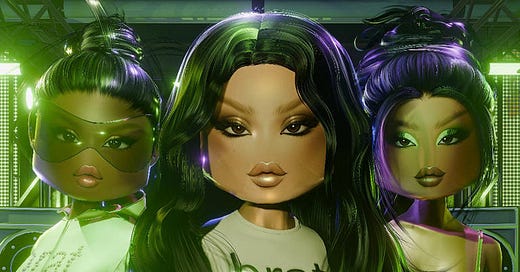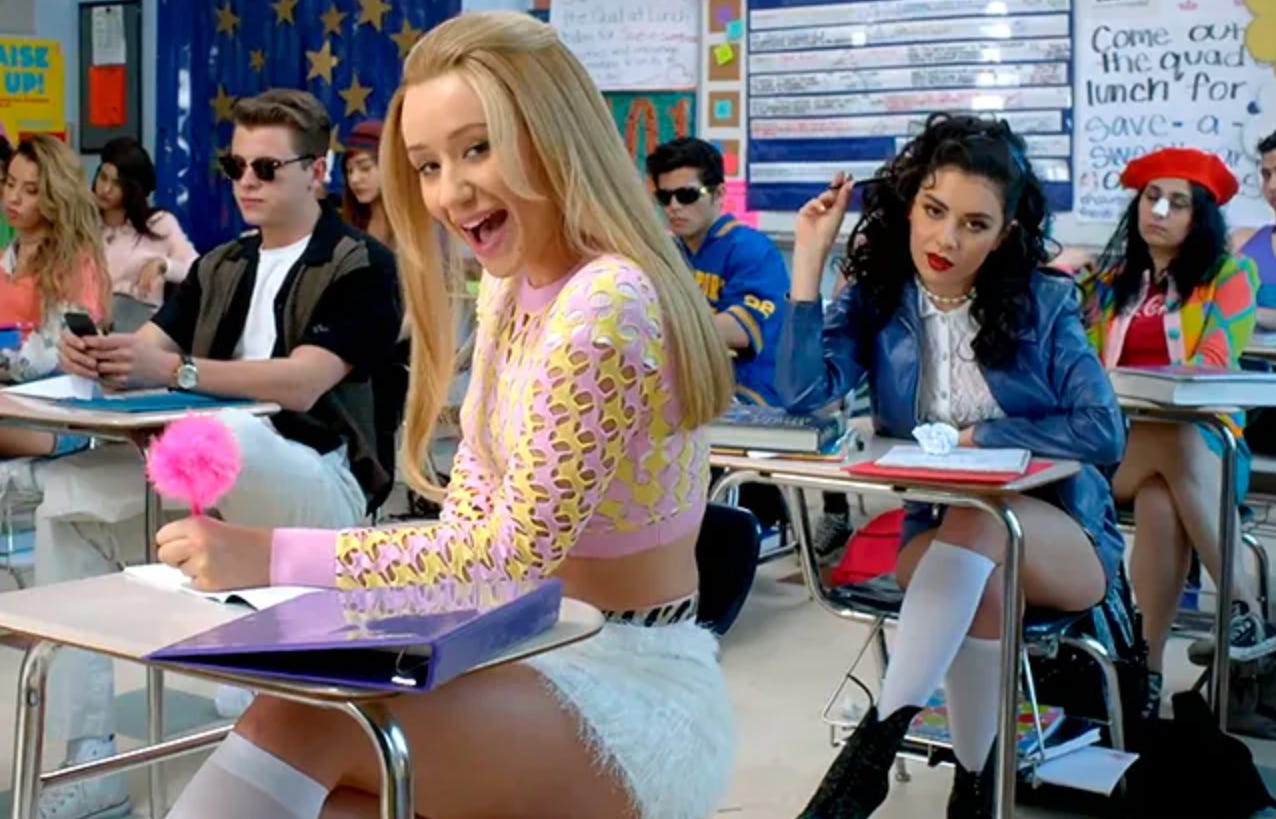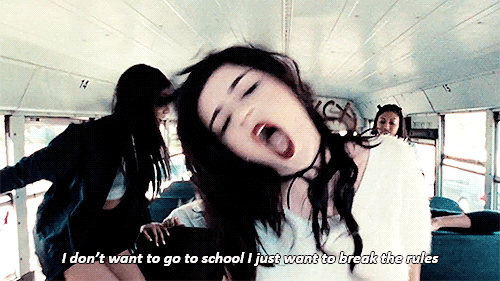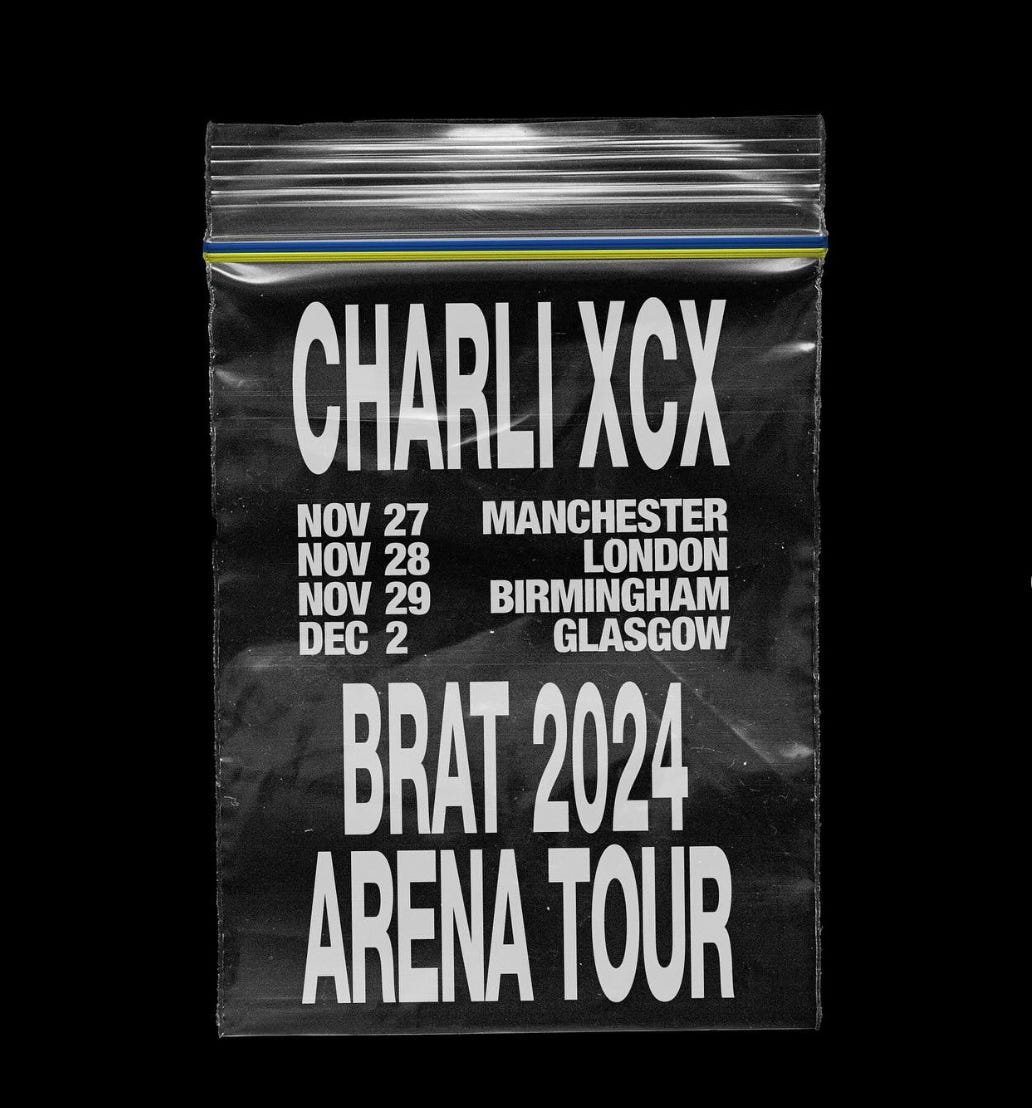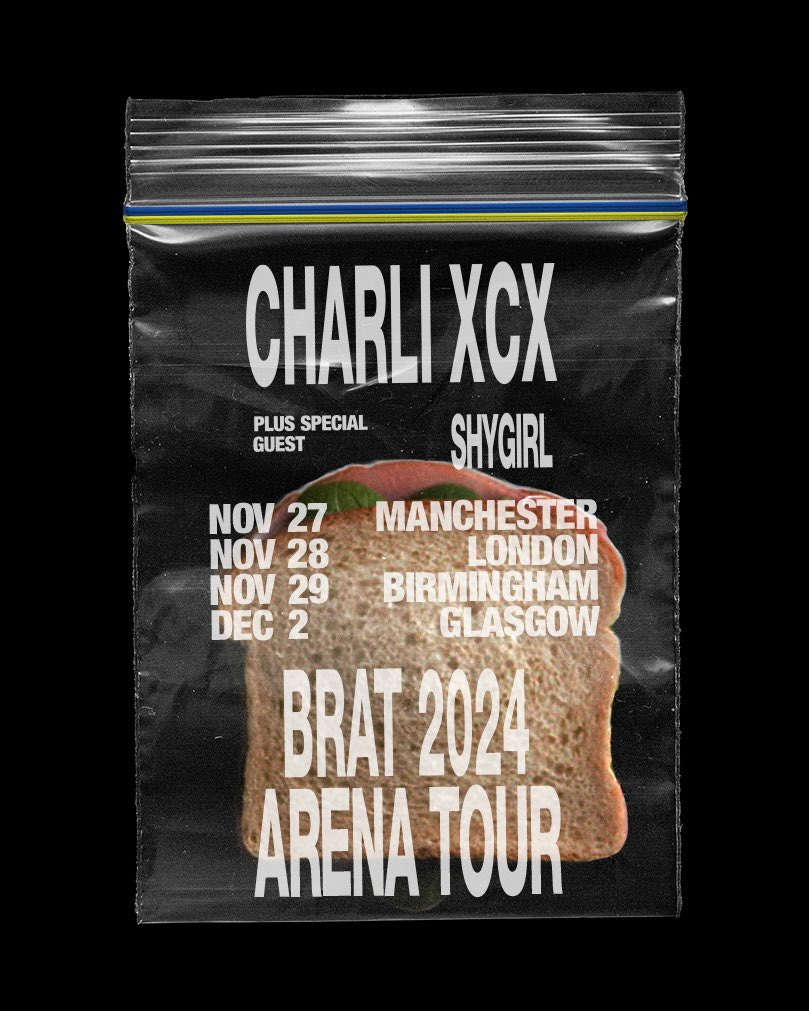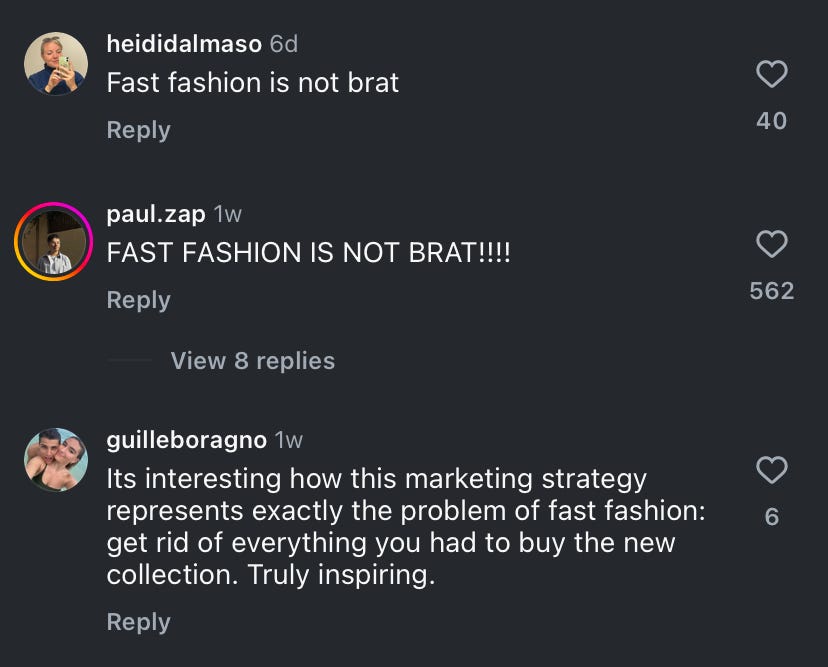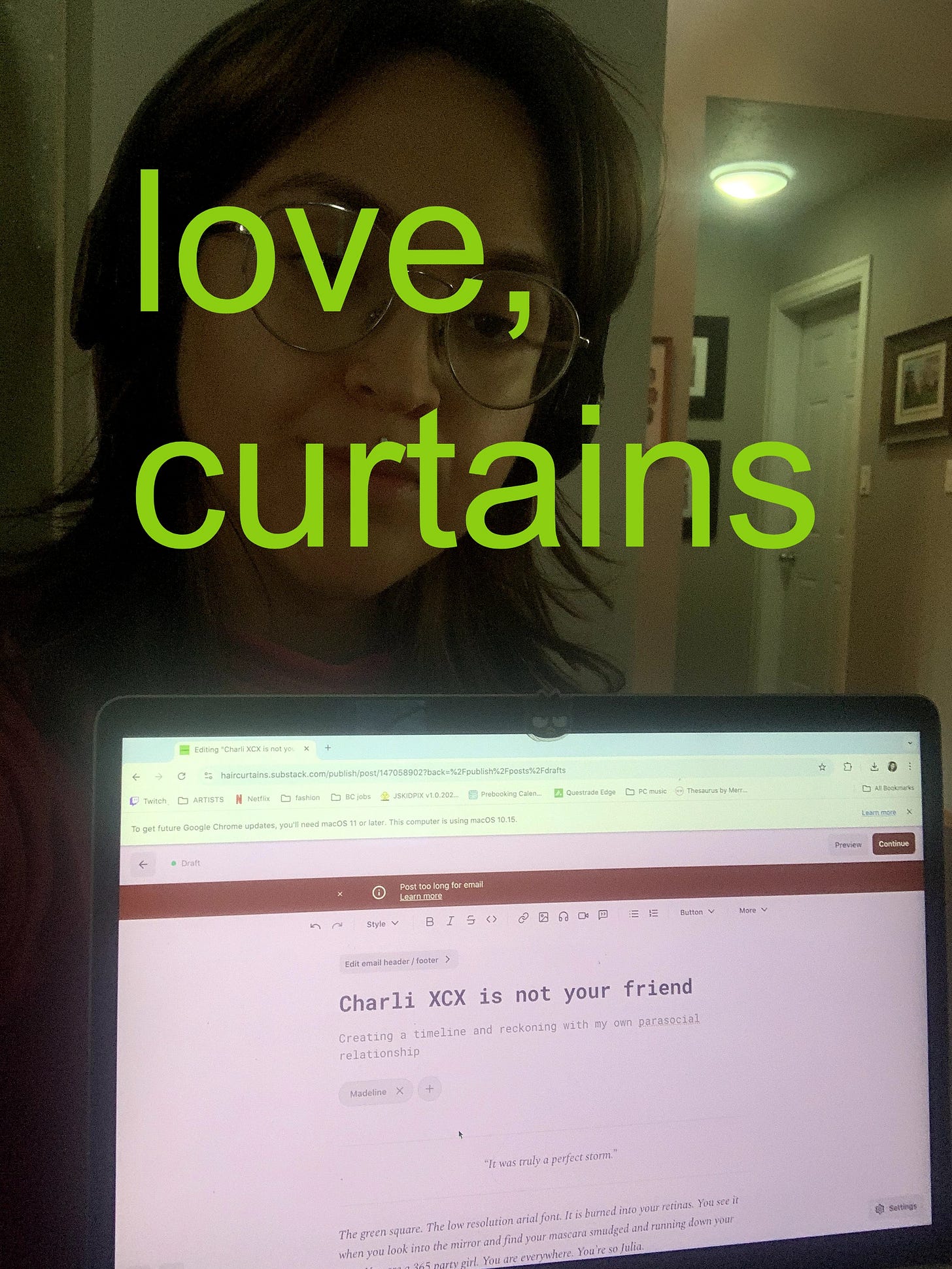Charli XCX is not your friend
Creating a timeline and reckoning with my own parasocial relationship
“It was truly a perfect storm.”
The green square. The low resolution arial font. It is burned into your retinas. You see it when you look into the mirror and find your mascara smudged and running down your face. You are a 365 party girl. You are everywhere. You’re so Julia.
What’s up, chillers? Today I was walking down the street and passed someone carrying a neon green poster board and had to fight the urge TOOTH and NAIL to not exclaim “BRAT SUMMER” at the stranger.
For those who are not aware, pop artist Charli XCX released an album on June 7th called, Brat. Since its debut, it has achieved critical acclaim and massive commercial success. The album cover is rather plain: the word, “brat” displayed on a plain backdrop of a garish slime green.
Who/what is Charli XCX:
Charli XCX often describes herself as an experimental pop artist and collaborations with other experimental artists/producers such as PC Music’s A.G. Cook, 100 gecs’ Dylan Brady, Umru, and the late SOPHIE. However, she has also collaborated with other pop icons such as Kim Petras, Lizzo, Brooke Candy, Troye Sivan, and Sky Ferreira to name a few! Charli XCX has mastered the ability to push the envelopes of pop conventions while also having mainstream appeal. However, this has been a common sentiment in Charli XCX-related discourse for years. What has happened between then and now? How did brat land Charli XCX into the realm of profound fame and notoriety?
The hot topic on video-essay-youtube right now is Charli XCX lore but perhaps understanding Brat effect on culture means looking at our own personal experience. Plus, this is my blog so I am going to talk about myself.
My first experience of Charli XCX was probably the same as many others: the 2012 hit single, “I Love It (feat. Charli XCX)” by Swedish pop duo Icona Pop. While this song was (and is) a banger, I don’t think many people in North America were attuned to who Icona Pop was, let alone a feature on their one hit wonder. Nonetheless, the song was massive and still a dance floor staple in the present day. The next time we saw Charli XCX in the zeitgeist was about two years later in the release of “Fancy (feat. Charli XCX)” by Australian pop-rap artist Iggy Azalea. While the song was an earworm, it was not a great moment for pop music. Iggy Azalea was heavily criticized for appropriating Black aesthetics, mannerisms, vernacular and music and for also being so damn goofy while doing it. Had Azalea not featured Charli’s posh vocals on that chorus, the song would probably have just sunk into irrelevancy. In 2014, Charli XCX released the original song “Boom Clap” for the film adaptation of John Green’s “The Fault in Our Stars.” The movie, the actors, the soundtrack and source material were praised and beloved among youth, especially those who were active on the blogging site, Tumblr.
Speaking of tumblr…
During the early half of the 2010’s, there were some other interesting things happening in pop music. “Video Games” by Lana Del Rey was released in May 2011 and my brain chemistry was also altered for better and for worse at this time as well. Lana Del Rey’s full length album was released the following January. While Lana Del Rey spent much of her early career in the “alternative genre” section of the Itunes store, the internet would lead her into the mainstream pop sphere where she resides still today. Another monumental release during the era was Lorde’s Pure Heroine in 2013. Tumblr also fuelled the popularity of similar bands such as Marina & the Diamonds, The 1975, The XX, and The Neighbourhood. Interestingly, at the turn of the decade, the charting hits were recession-pop favourites like “I Gotta Feeling” by the Black Eyed Peas and “Party Rock Anthem” by LMFAO.
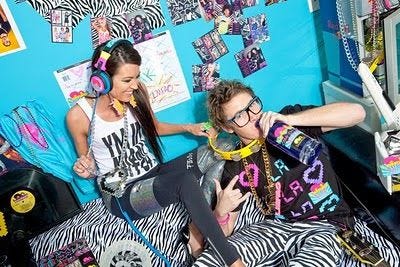
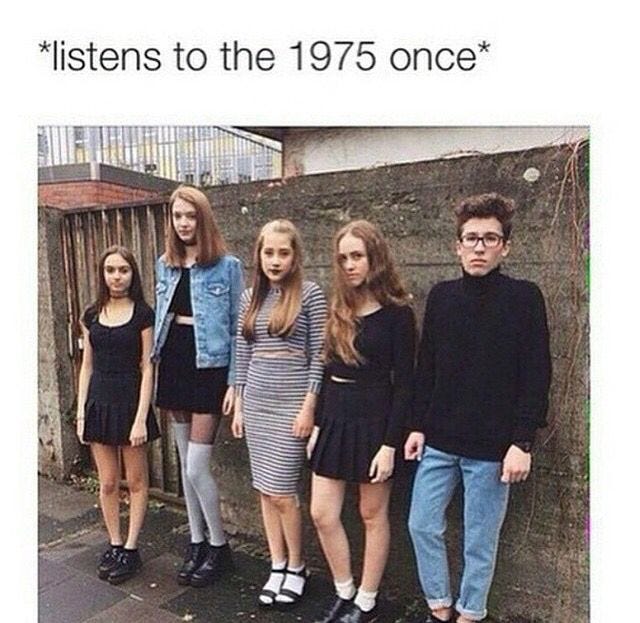
What changed?
My speculation is that the proliferation of tumblr among girls and queer youth created a different market different from what traditionally drove music sales and popularity. Tumblr was a blogging site that had a similar dashboard system to twitter, instagram, and facebook the ability to scroll through content from other blogs you followed. The text-post mechanics indexed discourse contributions in a visible thread that could be reblogged whether or not the user decided to weigh in. It was broader than a forum but more concise than a twitter thread. Blogging sites such as MySpace, Piczo and Wordpress fostered personal pages dedicated to specific interests but Tumblr prioritized engaging with other users. It is where subcultures would come to meet, mingle, and sometimes, brawl it out. In the past, alternative interests were separated by domain- geographical or web-based. On Tumblr in the 2010’s, subcultures and pop cultures melted, mixed, and melded together to form zeitgeists that eventually seeped into the mainstream. The nerds and gay kids loved this sh*t. It was a place you could belong no matter how fringe you were treated at school or at home. You could share how you were feeling without being judged or “clowned in the comments.” It was not only a place to feel safe being yourself, but you could portray yourself how you wanted without being marginalized in a heterosexually dominant society. Tumblr fostered a highly emotional environment which trickled outward to real life sensibilities quickly.
Getting older:
Other than Charli’s few hits through my teenage years, she wasn’t on my radar the same way Lorde and Lana Del Rey were. I have a distinct memory of getting my makeup done for the school play by the tuba-player with pink hair, who pulled up “Break the Rules” on Grooveshark while she beat my face for the stage. In retrospect, it makes complete sense that the early fans of Charli XCX were people like the pink-haired tuba player..
In 2017, an ex-friend turned me onto “Boys” and informed me that Charli XCX was the moment. I was admittedly perplexed: “Like Charli XCX from the Iggy Azalea song?” and they said, “Yeah, she makes really fun music and she’s also beautiful.”
Near the end of the year, my best friend of the time and I were hanging out after I had a recent heartbreak. “Charli XCX just released Pop 2” he said, assuring me that this was the perfect bandage for my aching heart. As he played the album from spotify, I was pleasantly surprised to see features from MO, Tove Lo, and Carly Rae Jepsen, who were artists I liked as a teenager. “I’m so ordering the vinyl” he said, “I already have No. 1 Angel.” He went on to create me a “post-breakup empowerment” playlist with Trophy and Vroom Vroom which jarred me every time they came up on shuffle.
The following year, my social circle got a massive overhaul post-aforementioned heartbreak. I did what I knew best and turned to the internet in my loneliness (which in this case was a good thing(rare)). Saskatoon Twitter (capital “S” and capital “T”!!!) was the unusual mode in which I found many of my friends whose company I still keep today. The nature of Saskatoon Twitter, like the early 2010’s tumblr, hosted a space where many of the users were of LGBTQ+ identities. Charli XCX was simply a household staple in the community as an electro-pop princess. While she was a recognizable name for many, she was also underground enough to still be cool. However, I quickly realized that the affinity to Charli’s music was not happening in a vacuum. She was part of a larger framework of artists that were discussed, shared, and circulated on the internet because of a specific affiliation: Her proximity to the late and legendary, SOPHIE and the world of PC Music.
PC Music & SOPHIE/ Why Trans Kids Love Hyperpop:
PC music was founded in 2013 by A.G. Cook and artists from the original roster included artists such as Hannah Diamond, GFOTY, Danny L Harle, and EASYFUN, who were all beloved by my new friends. PC Music was the hallmark of what would become known as hyperpop by Spotify. Hyperpop is maximalist, glitchy, harsh, squeaky, and even obnoxious. Many artists do not claim the assigned title because it was created by the same industry they set out to subvert.
Throughout the early 2010’s, social media was becoming increasingly sophisticated and people who were “othered” in real life finally had a space to disseminate information with cutting-edge efficiency. However, music streaming and advanced algorithms had not yet arrived. Music listening trends were still heavily influenced by wealthy record labels and radio stations. As Clive Martin laments in a 2014 VICE article: “Most modern music is slickly and routinely mastered, packaged, and marketed. The instruments might sound different, but essentially the songs are the same; palatable, disposable, and forgettable. Tracks go through the same processes at the same studios not so that they stand out, but so they sound like everything else.”
The experimental pop coming from PC Music subverted mainstream pop and the industry at large. It was an accelerationist response to consumerism: often glitchy, industrial and metallic while also being excessively airbrushed, cute (kawaii-adjacent, even), and chromatic- sometimes even alluding to vehicular, fashion, and makeup branding. According to critic Sasha Greffin for Pitchfork, “PC Music utilizes the banality and omniscience of branding as an aesthetic tool the way punks deploy teenage aggression; it's fundamental to the work.” A close partner of PC Music, Sophie Xeon built her sound around unabashedly exploring and subverting gender norms and sexuality. In an article for Bricks Magazine UK, writer Joel Danziger reflects on his experience being a teenager discovering PC Music while simultaneously figuring out his queer identity:
“The feeling was euphoric, finally being able to let go of those insecurities and the fear of an imminent hate crime or mocking laugh from a group of straight boys; hearing the music that I actually wanted to hear, surrounded by people who all felt the same way.”
The early 2010’s saw some queerification of pop culture such as Lady Gaga, Glee, early seasons of RuPaul’s Drag Race, and let’s not forget Macklemore’s “Same Love.” While there was acknowledgement of lesbians, gays, and bisexuals in the mainstream discourse, there was little to no representation of transgender communities or their struggles. The facade that rainbow capitalism was trying to create was flimsy and inauthentic. PC Music was unique, inclusive, and opposed the same systems that keep queer communities from self-actualizing in the real world. PC Music was able to flourish among queer youth on the internet. And the queer youth were very much ~ON THE INTERNET~. From a dissertation titled “A Computer-Mediated Escape from the Closet (2016),” author Brandon Miller writes:
Due to the secretive nature of non-visible stigmatized identities, as well as the heterosexist world in which individuals are raised, the Internet has been seen as a particularly useful tool for LGBTQ individuals. Research has illustrated that sexual minorities find the Internet to be a place where they can discover and manage their stigmatized identities, as well as find a sense of community.
Perhaps stated more succinctly, the words of a now-deleted account on r/HYPERPOP: “the community is really young, really online, and welcoming of those who feel outcasted.”
Charli XCX and The Fanbase
When Charli XCX started officially working with PC Music and SOPHIE around 2016, the shift was notable. This is perhaps when Charli XCX truly entered the queer zeitgeist among the ranks of other PC Music acts. From the beginning, Charli XCX appeared to practice an active ally-ship that ran deeper than just the “love-is-love🌈!” sentiments of the 2010’s as she worked closely with SOPHIE and the team at PC Music. While versions of rainbow capitalism were visible, atrocities and inequities for trans communities still remained comparatively unaddressed. Charli XCX was a public figure who believed in protecting queer people and youth across the entire LGBTQ+ spectrum. The acknowledgement and celebration of trans identities from a cis, straight pop star helped her build credibility among fans.
Besides Charli already being a familiar name/face from tumblr, she also had the most accessible music as opposed to the garish sounds coming from much of the PC Music lineup. A former tumblr pop star who is aligned with the most influential trans woman in pop with a relatively accessible discography? The storm was really beginning to brew.
Internet Music Nerds:
Along with the rising internet niche stardom, Charli got Fantano’d. Her pre-PC Music album True Romance (2013) earned a 3/10 from Anthony Fantano. However, the Vroom Vroom ep (2016) and No. 1 Angel (2017) earned an 8/10 and 7/10 respectively. While TheNeedleDrop certainly is not the word of god, and his fandom is insufferable, he is an incredibly influential music journalist. Before getting Fantano’d, I’d consider Charli XCX in the realm of listeners of The 1975, Arctic Monkeys, Lana Del Rey, Marina and the Diamonds, Lorde, The XX, and even One Direction, Little Mix, and like…Cher Lloyd?
However, after Fantano praised her PC Music-produced work, Charli XCX entered full escape-room topster-user regard, among the ranks of a totally different realm of the internet music-scape.

Even as her fame spread into further reaches of the internet underground, I believe Charli XCX understood the value of her fanbase. She understood how much of her fanbase was queer and what her music meant to them. She also recognized the power of queer communities historically being tastemakers in culture. In fact, in an interview with Tony Lee in 2021, Charli remarks:
“generally, the queer community just has, like, better taste”
While she kept a healthy distance from her fan base, she knew how to use the internet to keep her fans invested in her. It wasn’t just a ploy for fame, but rather a genuine connection she fostered online. During the pandemic, when the music industry took a major hit, Charli was still active on her own fan forums, interacting with her fans, disclosing her feelings and challenges as a musician unable to play gigs or go to clubs. The documentary, Alone Together chronicles the creation of the album How I’m Feeling Now which was released in May 2020. Charli hosted a series of livestreams where she enlisted the collaborative efforts of her fanbase to create the album. This all happened before the term, “parasocial relationship” truly entered the zeitgeist. As a society obsessed with celebrity culture, they have always been there, and have been brought to the extreme through the proliferation of social media. Sometimes parasocial relationships are marketing tactics (see: the influencer) and often they can be incredibly harmful. Otegha Uwagba writes for the Guardian:
“By design, social media algorithms reward the type of disclosure that invites parasociality. In the digital age, many creators’ livelihoods depend on that ever elusive and highly sought after metric of “engagement”, prompting them to offer up an access-all-areas pass to their lives – and the politics of personal disclosure are especially fraught for women.”
In the aforementioned article, Uwagba describes a “paradox of low-level fame” where a figure with a smaller audience feels more intimate, “normal,” and ultimately, accessible to the fanbase. As a MySpace veteran, Charli XCX knew how to interact online and utilized the loyalty of her fans. During a time of uncertainty and isolation, she was able to foster a space to gather, create, and even party. She was unfiltered (pun not intended) and allowed her fanbase to have access to her which in turn, benefitted her greatly. Her fans became absolutely ride-or-die if they weren’t already before.

Charli & Crash- pre/post pandemic Charli:
The 2019 album, Charli, was absolutely fanning the flames of Charli XCX’s popularity amongst the chronically online music geeks. The album had features from Carly Rae Jepsen (Anthony Fantano’s sweetheart & bisexual Canadian Princess), Troye Sivan, Kim Petras, Tommy Cash, LIZZO??, Yaeji, Brooke Candy (deep cut!!), HAIM, and the enigmatic, never to be seen again, Sky Ferreria. It was clear to fans that Charli was working with artists with visions she trusted. It was also no mistake that Charli prioritized having queer voices showcased on the album. She was always loud about her allyship, her gratitude to her queer fans, and her recognition of the struggles and inequities that exist for LGBTQ+ communities. And we all love(d) her for that.
I must admit, I have never listened to Crash (2022). It was her last album in her contract with Atlantic Records and she was working hard to give herself a stable platform to leap from when she made the official departure. During 2022-2023, She had several contributions to other remix albums and movie soundtracks such as Hot Girl for Bodies, Bodies, Bodies (2022), and the charting hit, Speed Drive from the Barbie (2023). She also had a public scandal over unfollowing Rina Sawayama after the Beg For You-collaborator threw shade at Matty Healy of The 1975 after he had made racist remarks on a podcast.
Indie Sleaze Revival, Brat Summer & Consumerism:
After departing from Atlantic Records with what many consider her “pop sell-out album,” Crash, Charli XCX was ready to take her vision, brand, and marketing into her own hands. A video essay by Youtuber, Jordan Theresa, compares Brat summer in 2024 to Barbie summer in 2023. Both were heavily associated with femininity, fun, and a specific colour. While the Barbie press roll-out featured Margot Robbie sporting ~barbie pink~, you never see Charli XCX in Brat green. Barbie summer also featured countless (like, literally i keep losing count there were so many) collaborations with companies such as NYX, Crocs, Forever 21, Coldstone Creamery, and more with products stamped with the Barbie Logo in the same shade of barbie pink. Jordan Theresa elaborates on foil of these two summers, noting that fashion writers and social media marketers are having a harder time to encapsulate a “brat summer aesthetic” into consumable products. Charli herself stated that the brat summer essentials were cigarettes, a bic lighter, and a strappy white top.
Another interesting comparison Jordan Theresa makes is the Brat summer in the context of Indie sleaze. Jordan Theresa argues that the indie sleaze revival is not quite here yet. I believe it has arrived as much as it possibly can.
Hop over to the Indie Sleaze instagram and you’ll notice that the fashion trends are hard to pinpoint. People were wearing whatever! Calling Indie Sleaze an “aesthetic” may be a misnomer, because like Brat, it is more of an attitude and a lifestyle than something you can buy. While Barbie was lining the shelves, Brat has proved to be more elusive. Brat and Indie Sleaze both heavily involve partying, smoking cigarettes, smudged eyeliner, and well, Britain. In addition, there are many sonic choices on the album that are reminiscent of electroclash and bloghouse. I believe that Brat is as close to an authentic indie sleaze revival in the mainstream that we will see.
An excellent article by SOTA outlines step-by-step what brands can learn from Brat, SOTA writes that “we have on good authority that the vast majority of the Brat roll out is coming from Charli, not a marketing exec…this approach has established a distinctive, original, and uncopyable point of difference.” As mentioned earlier in this article, the internet began to crave authentic, emotional, raw content from public figures such as pop stars. These ideas on early-10’s Tumblr seeped out into the masses as social media became more sophisticated and ubiquitous. The growing power of the internet democratized and decentralized the trend cycle for just about everything, including music. The industries that were solely responsible for disseminating the Next Cool Thing, were at odds with people on apps like Tiktok turning old random indie songs into charting tunes with millions of streams (remember SALES?). This cultural shift paired with Charli’s aptitude for navigating and harnessing the internet was the beginning of creating a powder keg for her stardom and the Brat era.

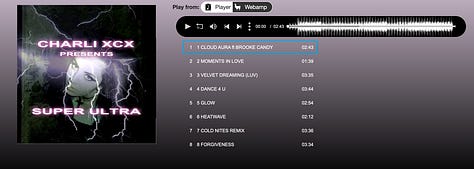
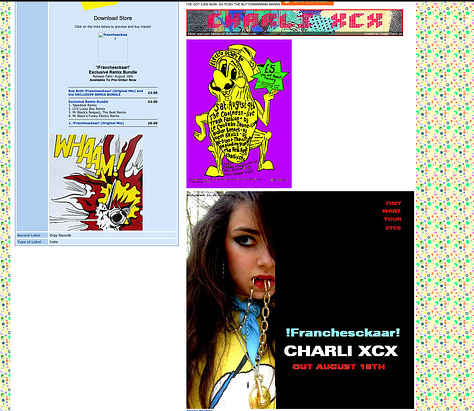


Charli is a seasoned internet personality, from her MySpace, to John Green’s tumblr girl, to creating How I’m Feeling Now, to her steady rise to internet superstar-status, she was ready to fully take over the mainstream. The pandemic upended society and the internet became the only third space for everyone, not just gay nerds. In an era where everything online could be faked, everyone wanted someone who had an online presence but maintained a sense of authenticity. Who better than Charli XCX who has been working this angle for over a decade? Even Camilla Cabello and Katy Perry have been (rightfully) accused of trying to rip off charli’s brat attitude with no avail. White Brat has been an album since June 2024, Charli has embodied the “brat” attitude for much longer.
Charli XCX is Not Your Friend:
After I Love It with Icona pop, Charli fell into relative obscurity. She partnered with the powers of SOPHIE and PC Music to steadily put her name on the map of the internet-underground’s beloved, starting with the LGBTQ+ community, and then branching out to the Fantano-head music snobs. By staying mostly in the shadows of the mainstream, she had the freedom to experiment and be herself. She fostered a die-hard fandom and gave them (what appeared to be) a healthy level of access to herself. She resided within the internet and greeted the general public with grace as they retreated to online spaces during a collectively uncertain and traumatizing period. All of these events shaped the zeitgeist perfectly for Charli XCX to release Brat to such intense acclaim. It was truly a perfect storm.
In an interview with Billboard, Charli says that she “wanted this record to sound like [she] was having a conversation with the listener in a true way.”
But the reality is: she is not actually having a conversation with you. In most cases, she never was.
As mentioned earlier in this article, the parasocial relationship is a powerful force that even I have succumbed to. At first, I felt rather angry and disappointed with how the topic of substance use and abuse had been treated by the album and marketing rollout. She does not try to conceal references to cocaine as she sings “365 partygirl, bumpin’ that, should we do a little key, should we have a little line?” The album and marketing, including Charli’s remarks/social media posts herself glamourize the brat life which in turn means glamorizing cocaine consumption to a young, impressionable demographic. Even a poster for UK tour dates showed the listed dates superimposed on top of a dime-bag. The government understandably did not allow Charli XCX to plaster these in public. Later, she added a sandwich to the poster, implying it was merely a humble lunch bag all along (which is pretty funny… but still!!).
I am not against drug use, nor do I think drugs are inherently bad. However, I felt that Charli’s glamorization was irresponsible. I hoped that as her North American SWEAT tour approached, she would roll out a sort of “party-safe” campaign. Hoards of young people are going to be attending this show and will be doing hard drugs- she is basically telling them to. Why not also encourage people to test their drugs, provide education on how to spot and respond to an overdose, or literally any other sort of harm reduction? North America is battling a toxic drug epidemic amidst dealing with increasingly inaccessible, unstable healthcare. It all seemed incredibly insensitive and inappropriate to me. I brought this dismay and disappointment with Charli XCX to a friend of mine who made an incredibly valid point I had not yet thought of: For decades, (mostly) men have been writing music that glamourizes drug use. The first example that pops into my head is Drake’s verse on Travis Scott’s Sicko Mode (2018) where he describes sedating himself with Xanax while flying in a private jet overseas. Or Future candyflipping Molly and Percocet while rapping about making money, driving fancy cars, and globetrotting in Mask Off (2017). These are just two examples I can think of in the recent past. This is the same recent past that we lost Prince, Lil Peep, and Mac Miller to overdose. The same recent past where my friend almost bought drugs from a guy down the street who, briefly after their encounter, was charged for selling pills that killed a girl my age. Future, Drake, and pretty much all the superstars of old such as The Beatles, Talking Heads, U2, Fleetwood Mac and more have been singing about drugs since forever. Why did I demand something different from Charli XCX?
Charli XCX, at least right now, is the people’s princess which seems to make her immune to criticism. It is important that she is infalliable. She is incredibly wealthy and was even before Brat. She is a business person looking to build more wealth. She aligns herself with some other shitty rich people, such as Matty Healy, and right-wing darling, Dasha Nekrasova of the Red Scare Podcast. Charli XCX is also gearing up to do a big collaboration with fast fashion giant H&M for fall/winter. She even attended the MET gala which costs over $70,000 to attend. She flaunted her wealth on that carpet alongside all of the less palatable celebrities. The general public was proclaiming “Brat Summer” and in the same breath, participating in the post-Met Gala “Digitine”. At the end of the day, while Charli XCX is smart, talented, and unique she is ultimately a celebrity, a millionaire and strives to perpetuate her brand. Charli XCX is not your friend.
Back to Us:
Brat has busted into the mainstream and it’s cool for artists you like to achieve success. Of course, I would be lying to myself if I said there wasn’t a big piece of my heart going “I liked it before it was popular.” My experience of Charli and the extended universe is intertwined with making some of the most influential friendships I have yet to make in my adulthood. They held me as I discovered more about myself, music, gender, attraction, politics, beauty standards, and community. My trans and non-binary friends I made at this period in my life are one of the places I felt the safest. I feel so lucky to have experienced Charli XCX (+ the extended universe) back then.
Charli XCX often references past projects and other artists in her work but for some reason I can’t fully articulate, the references on Brat feel even more poignant for some reason. For instance, the track “So I” is a tribute to SOPHIE: “your sounds, your words live on, endless.” There are deliberately unmistakable contributions of other producers are just as beloved as Charli in the online space such as EASYFUN, Dylan Brady,Hudson Mohawke, and obviously, A.G. Cook. Personally, my favourite moment on Brat is Club Classics, which was a single released early April 2024 where she proclaims:
“…Yeah I wanna dance to me. I wanna dance to A.G…I want to dance to SOPHIE. I want to dance to HudMo…tight like Mike kinda flow…”
Hearing her shout-out A.G Cook, SOPHIE, Hudson Mohawke, and Mike Skinner (The Streets) in one verse followed by the unmistakable, enchanting A.G. chords under the sample of a teenage Charli repeating “right now” brings tears to my eyes. I just want to dance to the club classics, too, Charli! And maybe with her newfound level of influence, DJs will actually start playing them. We can only hope…
I am certain that the hype will fade as it always does. Of course this has changed everything for Charli XCX, and perhaps, for the entirely of pop music and the internet. This is the timeline that I believe explains why Charli XCX has blown up to this degree in 2024. As I recount the history of Charli XCX, PC Music, Queer internet etc., I also recount my own history and I understand myself. I understand where I come from, who I love, and what I value: In relationships, in music, in art, and how I choose to lead a life true to me. Maybe I feel so sentimental because as Charli moves into a new era of her fame- achieving mainstream success, selling out stadiums, and even releasing songs as she debates parenthood- I can’t help but feel a sort of synchronicity with her career and my own milestones. I am older too, with a completely different life. I feel the most self-actualized as I have ever felt and somehow, I also feel the most chaotic. Perhaps that is just a side effect of getting older: you learn more about yourself and the world which is great, but then you have all this new wisdom…and where do you put it all? Being honest, volatile, and not always knowing the right thing to do…Maybe that’s what Brat is all about.
As the SWEAT tour commences, Charli announces the end of Brat Summer as we move into the autumn
but…
I think I have always been in a Pop 2 winter <3
I had fun working on this article but i am so ready not to look at it again!! Let me know in the comments if you think there are any other things that have contributed to the 2024 XCX-hysteria.
See you at the SWEAT tour! (unless my flight gets cancelled by the Air Canada strike)

